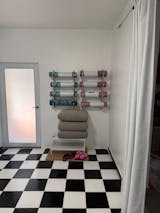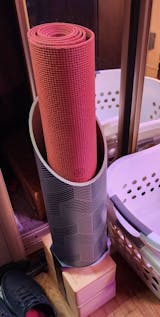Thank you so much for joining us for this interview Brienne! We would love to help your customers get to know you better. Can you share your "backstory" with us? What brought you to design for wellness?
My journey into a life of health and wellness started over two decades ago when I discovered yoga in my late teens. A few years later in college at the University of Oregon, yoga served me well by helping me to reduce my stress level during a demanding design curriculum, which resulted in my earning a degree in Architecture and a Masters in Interior Architecture.
Post-graduation, and shortly after securing my first architecture job, I discovered I had an auto-immune condition which made it difficult for me to expel toxins from my body effectively, left me nutrient deficient and led to several serious dietary allergies. These physical challenges further-fueled my personal commitment to the health and wellness path. During this time I became uber aware of not only the toxins found in some foods, but also in the built environment. I was setting up an interior architecture department within the firm and began to realize how many standard materials used in architecture and building were full of toxins with high potential for off-gassing dangerous chemicals into the built environment. This was something I was trying to mitigate in my own personal lifestyle and the lack of healthy finish materials, furnishings and home goods choices left me discouraged.
In spite of these health issues, I joined my co-workers in maintaining 60 hour work weeks, mostly stooped over a computer in a light-deprived basement. By this time, I'd held a regular yoga practice for a decade and had become a certified teacher in order to facilitate the health and awareness of others. I instituted lunch-time yoga classes in the office in service to myself and my hard-working team. Riding my bike to work everyday, I'd strap my heavy Manduka Pro mat to my shoulders to teach yoga at lunch and after work I would go to my local yoga studio to drink from the well of my own practice.
One morning, I had a brilliant idea, as I hoofed my bike, work bag, and yoga mat across the Willamette River. I envisioned a multi-tube yoga mat storage system for my local studio, whereby yogis like myself could pay a small monthly fee to store our mats at the studio, benefiting studios with increased customer loyalty and a dependable and recurrent monthly revenue. The studio and its members loved the studio mat storage system I created. What a relief it was to take that yoga mat burden off my shoulders- literally! Other studios began to show interest, so I developed custom mat storage units for several more studios on the side, helping these small businesses to grow and thrive.

After four years working and learning at the architecture firm I decided to start my own design firm and follow my dream of integrating wellness into interior design. My first company, 2Yoke Design, began. In addition to designing and building custom yoga mat storage units for yoga studios, 2Yoke Design’s portfolio includes eco- and health-conscious homes, health clinics, farm-to-table restaurants, ergonomic workplaces and co-housing communities.
It was designing in this capacity that truly opened my eyes to the critical lack of non-toxic materials and manufacturing processes in the architecture, furniture and home goods industries. On both a personal and professional level I could not find anything on the market that was aesthetically pleasing, eco-friendly, and specifically designed to house fitness gear, yoga mat, blocks, foam rollers, straps, etc. So, I designed a totally tubular storage manufacturing company in order to satisfy this need, and Mache was born.

Can you share the most interesting story that happened to you since you started Mache? What were the main lessons or takeaways for you?
Most companies were blind-sighted with the emergence of Covid-19 and faced many challenges from lockdowns to bankruptcy, and start-up companies like Mache were no different. In fact, young start-ups, like Mache, do not have the payroll history required to qualify for the SBA’s Payroll Protection Program, and were as a result, were undoubtedly less able to weather the upheaval presented by what later became a global pandemic.
At the time the virus became known, Mache’s business strategy was solely focused on yoga studios, building modular and custom storage to support yoga studios and their bottom lines. Although we incorporated in late 2019, we looked to January 2020 as our strong launch into yoga studio storage sales. In the first few months of 2020 Mache had secured purchase orders from several studios for custom yoga mat and prop storage systems. Then Covid hit! Studios were forced to close and purchase orders were immediately canceled, resulting in a very scary time for a new company in the fitness studio market.
One of Mache’s guiding principles is Embrace Change, which involves assessing the situation at hand, adapting to the situation, and evolving by staying resilient to outside factors beyond our control. Covid gave us a real life opportunity to put this principle into practice, and we did. We were able to survive this unexpected and potentially devastating downturn to our fledgling business by pivoting hard from B2B (business-to-business) sales to exclusively B2C (business-to-consumer) sales. It felt like re-directing a team of eight horses mid-stream, but we did it by directing all of our focus, resources and dwindling cash on hand to offering yoga/fitness storage to the at-home-fitness market.

Most people were starting to come to grips with the new “normal” which required many to contemplate how to balance and accommodate work, school, family, play- all from home. Yogis, some for the first time, were looking at how to continue their regular practice exclusively at home. Mache was fortunate enough to see a window of opportunity to be nimble as we made the quick shift from B2B to B2C. Most importantly, we felt called to help the global community embrace self-care routines and dedicate space in their homes for wellness during a time of chaos and uncertainty.
We learned how important it is to stay fluid as a company, to embrace change without fear. We continue to assess the needs of our customers so that we may continue to generate new ideas, strategies, and products to accommodate ever-changing lifestyle shifts, marketplace trends and the world around us.

Can you share a story about the biggest mistake you made when you were first starting? Can you tell us what lesson you learned from that?
Growing the right team for a young startup company can be a struggle and, in the very beginning, I definitely had a few painful misfires. Not everyone is cut out to be a part of a small scrappy team run by a passionate entrepreneur. There are definitely risks involved, not only for the CEO and the long-term health of the company, but for the employees, as well.
Being part of a small crew requires team building skills from the CEO, but also the ability of the team’s members to work effectively as a team. At Mache, all employees are expected to wear many hats during an average day. The ability to move from one task to another and support every department when needed is not an easy skill set to find. We found that even if a person may believe they have this fluidity and team spirit, when it comes to actually rolling with it in real time, it proves to be a challenge.
A start-up company rarely has the resources in the beginning to offer all the benefits it would like to for their employees, and management needs to communicate to employees the start-up mentality and expectations, as well as the potential benefits they will realize down the line. Therefore, finding people who genuinely have a passion and believe in the company’s mission from the start, who are committed to the company-building process, and believe in the shared future rewards is not an easy task, but essential to the success of the enterprise.
Early on, Mache had one crucial employee leave the company at short notice due to fear of Covid and its potential effect on the company’s path to success. We also had to let an employee go within a few months of hire due to their inability to support other departments and work effectively as part of a team. No employer likes to see people leave the company or have to let someone go, and there is no way to eliminate this from happening entirely. We did learn to paint a more realistic and complete picture of life at a start-up company and the expectations that lie within to help ameliorate this human resource issue.
Ultimately, as the CEO, I am committed to raising the company as if it were my child and I am tasked with finding the best co-parents to help me with the job. I learned that I cannot hire employees under pressure and need to take the time and effort needed to find the right people to be part of the Mache family. In both cases mentioned above, I had a gut feeling that something was amiss, but my need to get immediate support made it difficult for me to hear my inner voice. Since then I have learned to trust my gut, and look for actions to back up words during the hiring process.
To be honest, I have been given multiple opportunities to learn this life and business lesson! I even assigned it as another guiding principle for Mache: Align Action & Word. Our words are not just empty vessels, but rather vehicles to express our intent and fodder for manifesting our oral commitments into concrete action.

None of us are able to achieve success without some help along the way. Is there a particular person who you are grateful towards who helped get you to where you are? Can you share a story about that?
My family has been extremely supportive of my journey to build this company and fulfill what I believe to be my life’s purpose. This dream started as a one-woman, tube-wrapping show and if it weren’t for the support of my family I would not have been able to position Mache as a lead contributor in the eco-design revolution.
My husband has the patience of a saint when it comes to living amongst and being asked to haul around hundreds and hundreds of jumbo paper tubes over the past two years! Being a scrappy entrepreneur means I take free labor wherever I can get it, and my partner is always there to lend a helping hand, be my sounding board, and encourage me to go on when things get tough.
My mom, who has recently joined the company, is a rockstar in customer service and sales, and I feel humbled and honored to work with her everyday. She is the strongest person I know and her bravery is a regular and life-long inspiration to me.
My brother, serial-entrepreneur and creative genius, has also been a guiding light as an invaluable advisor and the company’s first investor. Both he and I are most content when solving a puzzle by thinking outside the box.
It is with immense, heart-felt gratitude that I honor these three keystones in my life and all that they have contributed to the success of Mache, thus far.
Please join us for Part II of Thrive Global's Interview With The Founder of Mache on Mache’s Wellness Blog



















